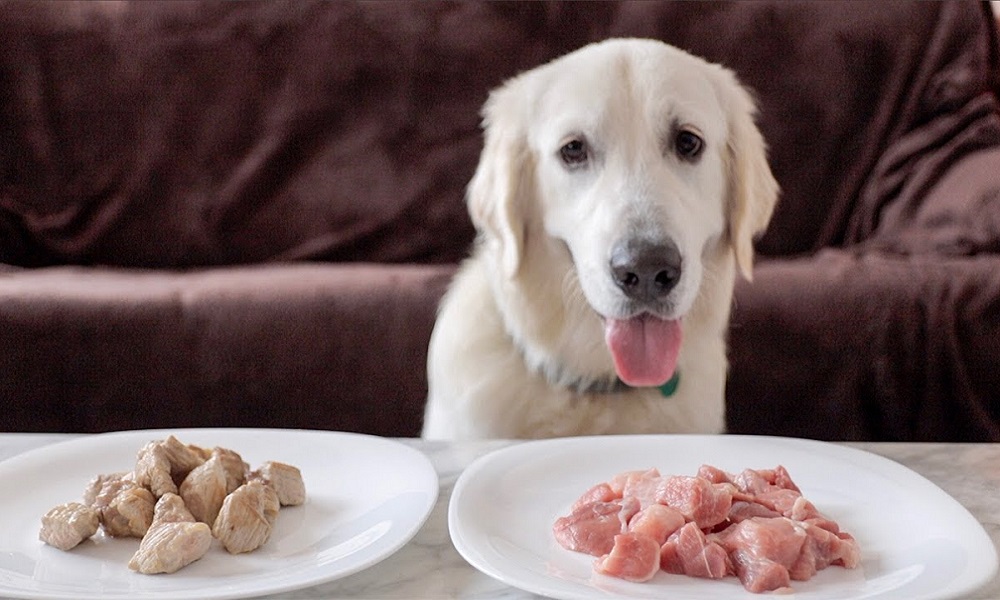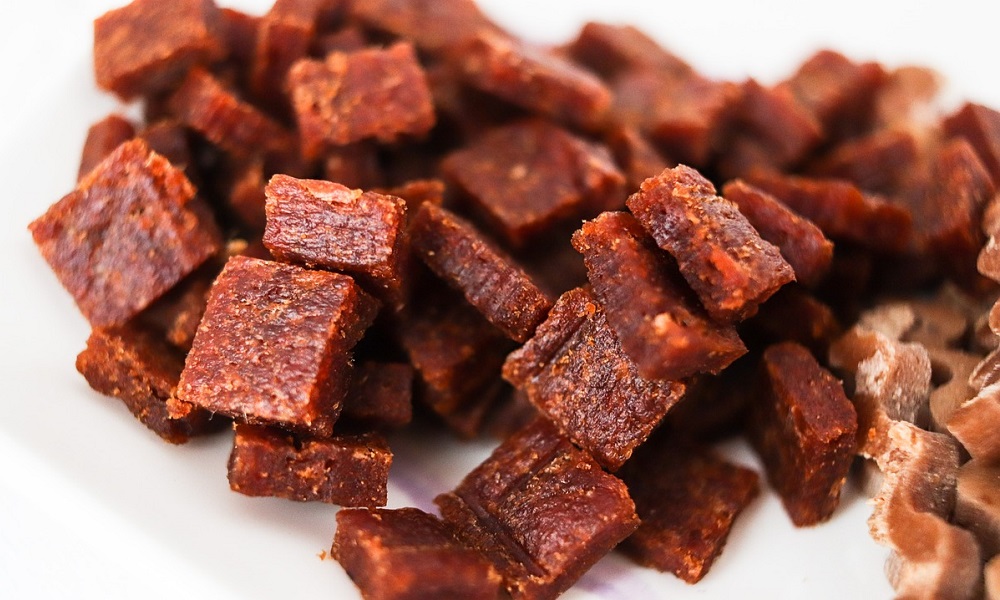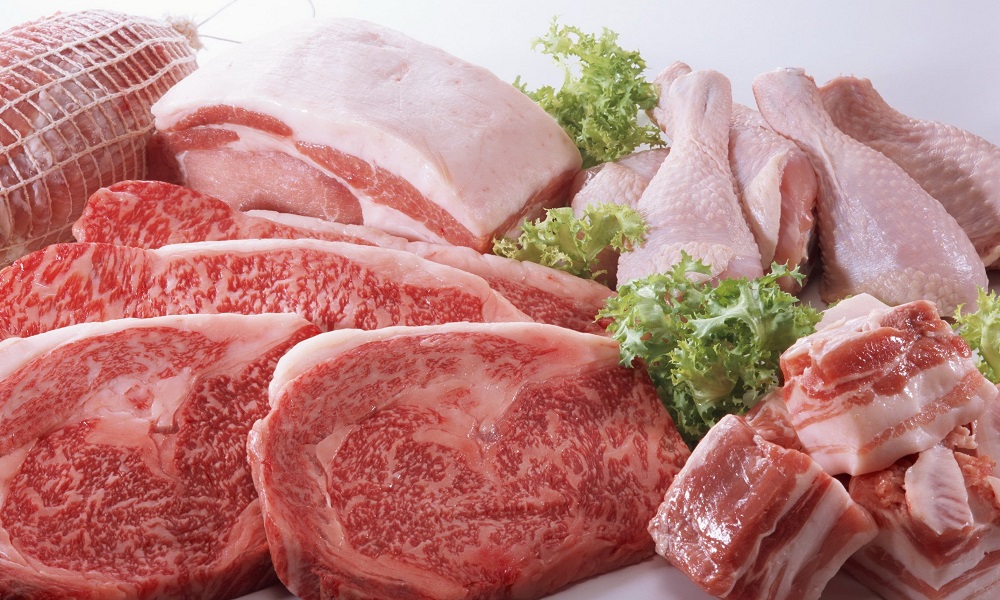Pet food is something all pet parents find themselves spending their money and effort on. It is a known fact that dogs are most happy and healthy when they are getting the right nutrients in their daily meals. One of the important nutrients is protein, and it is something canines need a lot. However, when it comes to meat, many pet parents wonder if they should give their pet raw meat or have it cooked.
It has been a long debate – some people say that dogs relate to wolves in their ancestry and benefit from meat in its raw form. These include both fresh and frozen forms of meat. Others say that for domesticated pets, it is best if the meat has been processed and cooked to make sure it is safe for consumption. These types of food include kibble, jerky, fish, and meat-flavored foods.
Are you struggling with finding the answer to this question? Keep reading because, in this guide, we will be talking about some myths related to dogs eating meat and whether they should consume it in its cooked or uncooked form.
Reasons Why Dogs Get into Raw Meat and Symptoms to Watch Out for
It is commonly known that dogs relate to their proud, hunting ancestors, the wolves. These features may or may not be visible in the breed; however, most canines do relate back to the howling wolves. Some canines like Siberian huskies even resemble wolves by their appearance.
However, this makes many people wonder if this says something about their pet’s behavior and food preferences. While the ancestry does indeed mark some characteristics of your pooch, however, if you have kept a canine, you will know that raw meat is not the only thing your pet will love to go for.
Excluding a few types of dogs, most of the dogs tend to chew on almost anything, be it their bed, toys, food in the trash, dead mice, etc. In short, they’d try to eat almost anything even if they later decide that it was not a good decision after all. This shows that while many dogs love meat, they are not exactly attracted to it as their sole source of energy.
With their evolution, dogs are now able to consume many others forms of food as well, and they need not rely on the old foods. Dogs being entirely unable to digest raw meat is also another misconception.
Almost all healthy dogs are perfectly capable of digesting raw meat, provided it is in its best condition and has been properly preserved. Similarly, choking on bones is a very common problem, and with a little care, you can make sure your pet does not suffer.
However, if your pooch suffers from stomach problems and intestinal disorders, it may be a good idea to consult a vet before adding meat to his daily meals.
Reasons to Not Feed My Dog Raw Meat
We explained above that most dogs do not have any problem digesting various kinds of meat. That, however, may have some exceptions based on the following reasons.
Raw Meat Has High Contamination Risk
Let’s face it, raw meat in the open air is basically a breeding ground for all sorts of pathogens. The fact that these microorganisms are always in the air makes raw food a risky choice. While your canine may love the meat in its raw form, there is no certain way of knowing that it is completely free from harm. Sometimes the symptoms show up slowly.
On the other hand, cooked meat is considerably safer. The heat automatically kills most of the harmful organisms and makes the food easier to preserve. If your pet suffers from digestion disorders, then getting a processed protein diet may also be easier on your pooch’s stomach.
Dogs Are Different From Their Ancestors
This statement is debatable. However, it is indeed true that canines today are not as ferocious as their ancestors were. Most dogs are domesticated, and this shows not only in their behavior but also in their physical structure.
Food sources that worked for wolves are not exactly the best option for dogs. Toy breeds like Pomeranians, for example, have been brought to us by artificial methods and have quite different meal preferences. Some canines are even allergic to grains and some types of protein. It is therefore recommended to look for a food source for a dog instead of a wolf.
It is Difficult to Regulate A Raw Diet
Last but not least, if you wish to measure the ideal daily nutrient requirement for your pet, you will find that it is difficult to regulate it in its raw form. While raw diet provides many nutrients, these also lack many important ones that are added in other dog foods.
These nutrients include the essential vitamins, minute amounts of calcium and phosphorous, etc. Due to these reasons, it is not recommended to keep your pet on a raw-meat-only diet. You may, however, include it in smaller amounts after consulting a vet.
If your pet shows any signs of unease, immediately remove the meat from his diet. If symptoms persist, it is recommended to consult a veterinarian.
What Should I Do If My Dog Ate Raw Meat?
While eating raw meat in a small amount should not be a cause of alarm, it is recommended to keep a close eye on your to check for signs of disturbance and unease.
The above list does show us why we should prevent an immune reaction or disorder before it occurs. However, if your pet has already consumed a considerable amount of protein and is now showing signs of distress, it is recommended to go through the following steps.
- Consult the Vet: The first obvious course of action is to seek a vet’s advice. Many vets nowadays do not recommend raw foods; therefore, you can expect some alarm from the other side when you tell them that your pooch has consumed raw meat. However, this does not particularly define what may be wrong with your pet. The severity of your pet’s health problem may range from minor to very harmful and depends on the amount and condition of meat. By taking the vet’s advice, most of these issues can be resolved.
- Keep A Close Watch on Your Pet’s Behavior: The consequences of consuming raw meat vary from pet to pet. Some dogs are fine after eating almost any sort of thing. Other canines may be more sensitive, and some may even get the runs. However, an upset stomach alone is not a big problem. Your pet will be fine after a day or two, that is if there are no other big changes in your pet’s behavior. However, canines who refuse to drink water or eat their favorite treats may be having a bigger health issue.
- Watch Out for Severe Infections: The signs include fever, throwing up, and diarrhea. This usually happens when something toxic is present in the raw meat, and its consumption is usually never a good sign. As previously stated, in such cases, you should immediately take your pet to the vet and follow the provided guidance.
If, however, your pet is only mildly disturbed, stop giving him protein for the time being and change his diet to a lighter, easy-to-digest alternative. If this is your pet’s first time trying meat, it may be best to start slow and give him time to adjust to the new diet.
How to Prevent My Dog from Getting Sick from Raw Meat?
Following is a list of things you can do to prevent your furry friend from getting sick. These are not absolute rules. However, most canines can benefit from these precautions.
Do Not Introduce Raw Meat in the Meals if Your Canine Has a Poor Immune System: This is the first precaution to take and can save your pet from a lot of health issues. Canines vary in their food preferences. Some pets can handle grains, eggs, and other ingredients in dog foods. However, if your pet is likely to have an immune reaction to protein, it is strictly advised to avoid giving him raw meat.
You may introduce meat in cooked or processed forms. These have already been broken down, so they do not invoke an immune reaction. Similarly, if the dog has a weak immune system, he is less likely to be able to consume raw meat, which has possibly more pathogens as compared to its cooked counterpart.
Consider Getting Prepared Raw Food: Prepared foods are made keeping your pet’s nutritional requirements in mind. These foods have the goodness of raw foods while being easy and quick to preserve. Therefore it is a safer option to go for these foods instead of raw meat alone. However, it is important to follow the preserving instructions on the package and make sure not to use it after the expiry date.
Ensure Cleanliness – Wash the food Bowl on a Regular Basis: Raw meat and an unhygienic environment combine to form the perfect breeding environment for many bacteria and fungi. Therefore it is recommended to keep your pet’s food bowl and the kitchen area strictly clean. Avoid giving him food near damp places and keep the trash out of reach of your pet. Raw food itself is not that dangerous; however, contamination is the true enemy.
Do Not Store the Raw Food for Long: While meat can be stored for longer in a frozen state, if it is your pet’s primary diet, it is recommended not to do so. Use the meat quickly and keep it safely packed away from all possible sorts of contamination. That way, there will be very less chances of harmful effects as the microorganisms will not get much time to grow.
Opt for Cooked or Dried Foods Instead: Last but not least, you can find other sources of protein to give to your pet. Raw meat is not the only nutritious meal out there. You can find specially designed food formulas to suit your canine’s needs. However, depending on your pet’s age, the requirements may be different. Therefore make sure your pooch is getting the daily requirements according to his size and activity.
Homemade pet foods and dried foods like meat jerky are a safe, delicious way of introducing proteins in your furry friend’s diet.
Conclusion
Whether or not giving raw meat to your pet is a good idea has been a debate for a long time. Raw meat is known to be more prone to bacterial infections and may not be the best choice for your pooch. However, instead of focusing on whether the meat should be cooked or raw, ideally, you should make sure that your pet gets a balanced, healthy diet.
Good pet food includes protein, carbohydrates, essential vitamins, and minerals in the appropriate amounts. Raw meat alone does not provide all these, and it is recommended to go with complete meals instead.
If you must include raw meat, it is recommended to do so in smaller amounts and keep an eye out for any signs of distress. If your pet feels unwell, it is recommended to consult a vet immediately.


